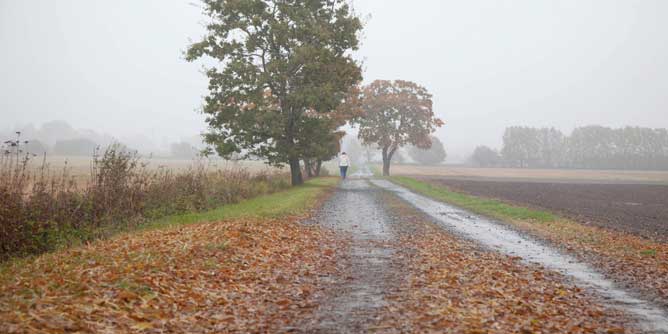Originally on NRK by Tormod Strand, Gunhild Hjermundrud & Kadra Yusuf
Breaking with Jehovah’s Witnesses saved Ramona Kvien Solgård’s life. Now she is fighting for the religious community, which receives NOK 14 million ($1.5 million), to lose state aid.
She has no doubt who is her favorite player of all time at Liverpool. Along with her husband, she has stood at Anfield Road singing full-throated, “We all dream of a team of Carraghers” to the tune of The Beatles’ “Yellow Submarine”.
For her and her husband, football and Liverpool are the new religion. She broke with her congregation and the Jehovah’s Witnesses four years ago. A breach she believes in many ways has saved her life.
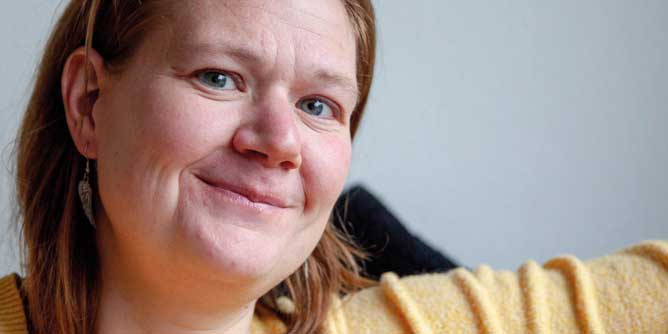
PHOTO: GUNHILD HJERMUNDRUD / NRK
“Your family is in a way taken as a hostage. There are angels who always monitor you. And there are demons ready to chop if you make a mistake. So no matter what you do, you are very limited, because you are terrified of what’s to come.
“It has made my life extremely anxious. I have three suicide attempts behind me”, she says.
Ramona Kvien Solgaard grew up as Jehovah’s Witness. Today she is 37 years old. Now she has burned all bridges and left the faith community for good. But life outside is new and unfamiliar.

PHOTO: GUNHILD HJERMUNDRUD / NRK
Choosing to vote is something foreign to a Jehovah’s Witness.
– Yes, I voted this year. What was a bit special was that this year I knew what I would vote for, but I didn’t quite know how to do it. So I had to get some help. We have been trained not to vote, she says.
Jehovah’s Witnesses are directed not to vote based on their interpretation of the Bible.
The woman’s place
But it wasn’t this that bothered her the most. To vote in elections is just one of many violations of rules that can lead to expulsion from the congregation.
One of the things she struggled with most was accepting that she as a woman did not have the same rights as men.
“It is reinforced that you are a tool and that you should not have any other place. You should never outdo your husband. You can’t be an ambitious person. Because it doesn’t work. So you stop being ambitious, you are just simple”, says the 37-year-old.
An unpleasant reunion
It has stopped raining for a while and Ramona runs on the wet streets of Moss, towards the building that was a part of her life for so many years, where the ones she has broken completely with still gather regularly, without her. “Kingdom Hall” it says on the wall.
“Are you ready?” we ask.
“No, but let’s do it.”
We took pictures of her for this report.
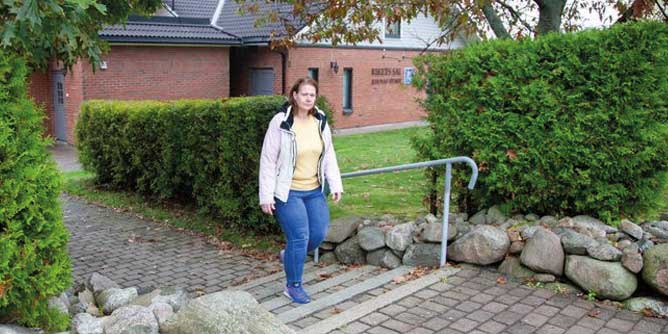
FOTO: Gunhild Hjermundrud 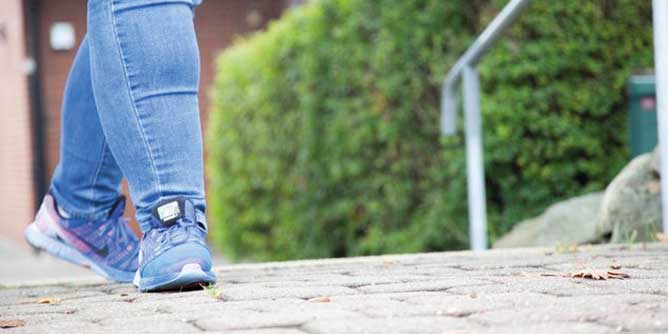
FOTO: Gunhild Hjermundrud 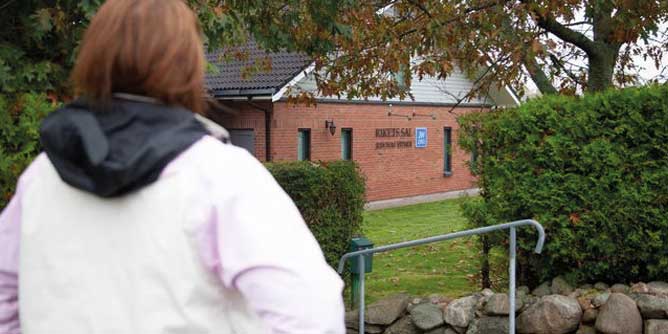
FOTO: Gunhild Hjermundrud 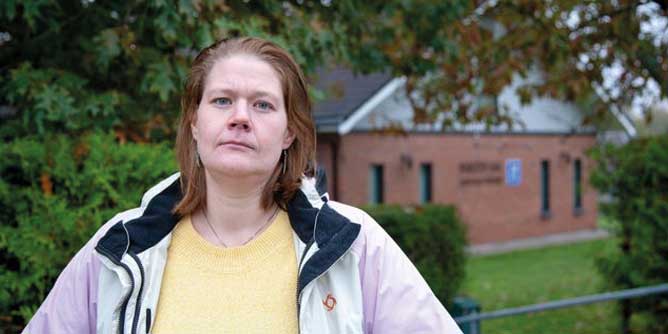
FOTO: Gunhild Hjermundrud
It’s cold. She turns and looks at the features on the wall: The blue sign that hangs on all the assembly houses. And the name they have given them: Kingdom Hall. Going up some of the steps. Half the steps, just what is needed to get a picture showing that she has left them behind.
– I think we have what we need, we say.
– Yes, have you?
– Yes. Are you okay?
– Sure, it’s fine, but my heart beats so fast.
We return to the car and Ramona drives us to a place that feels less onerous.
Doomsday

PHOTO: PHOTO: PRIVATE
In the state of New York is the headquarters of Jehovah’s Witnesses. Their teachings are based on their own understanding of the Bible. Central to this is the belief that Armageddon, or doomsday, is coming soon, and they are clearly on the right side.
In their own films and texts it is stated that the man is the woman’s superior.
The Watchtower is the magazine for the World Headquarters, located in the United States. This is the voice of the religious community to all members. The journal also states quite clearly, about the position of women.
“Unlike a foolish woman, who does not respect the leadership system, a wise woman has deep respect for this scheme. She does not have the disobedient and independent attitude that characterizes the world, but submits to her husband. ”
But the congregation also has strong opinions about what kind of man you can be, or rather not be.
Homosexuality
What is it like to grow up in Jehovah’s Witnesses and at the same time know that you are gay?
‘Fredrik’, since he was very young, has known that he was gay, but tried as best he could to hide hissexual orientation, and tried to convince himself that it was over. It became a difficult double life.
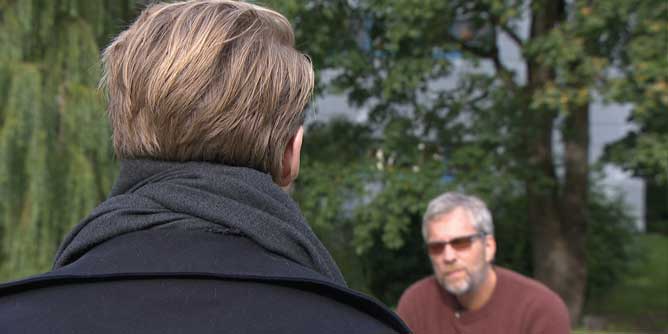
PHOTO: DAG ROBERT JOHANSEN / NRK
“For my part, it really made me sleep poorly. I developed a fear and was quite paranoid and scared. Although I did nothing wrong, I was scared to be discovered. I even remember being afraid to say things in my sleep.”
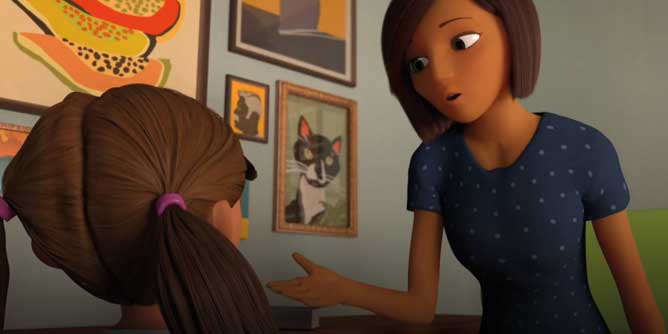
Finally, ‘Fredrik’ chose to leave the Jehovah’s Witnesses – he became an apostate. In doing so, he also lost his parents and siblings.
“I was shunned almost immediately really. And so it has been like that ever since. It has probably been 10-12 years now.”
Today, “Fredrik” is in his early 30’s. He has a job and is married to a man. And is in a nice place in life, as he says.
The turning point for him became a convention he was at, where sexual morality and homosexuality were the theme.
“My subjective experience was that we were peppered with negative descriptions of homosexuality. I was out of the room a lot, I couldn’t sit listening to the homophobia against gays. There was a lot going on that practicing gays were on a par with Satan, that all gays face a certain death. This is how I remember what was said,” recalled ‘Fredrik’.
He was only 20 years old, and noticed that it was apparent. He uses the phrase “holding the fort”, hiding his orientation. So he made the choice of his life.
“But it was quite dramatic to come out. I wish that on no one. But that’s the best I could do. I would not have done anything differently, in hindsight”, he says.
Abortion
Far from home and in another city we meet ‘Peter’. He does not live in Drammen, but we meet here, because he does not want his family to know that he is talking to NRK.
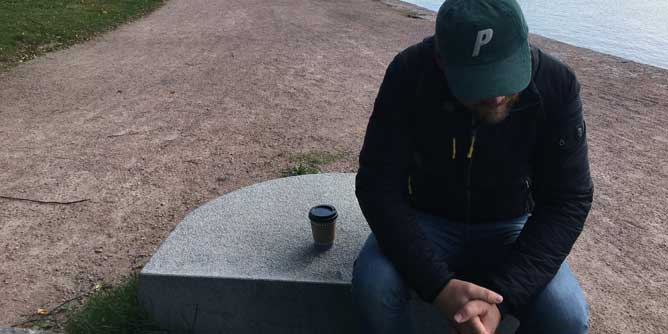
PHOTO: TORMOD STRAND / NRK
For Jehovah’s Witnesses, he is what the church calls a “fader,” to be absent, “fade away.” That one gradually loses faith. In reality, he has left Jehovah’s Witnesses. ‘Peter’ also has another reason for wanting to be anonymous, because he wants the children to continue to have contact with their grandparents, and he even has some contact with parents and siblings.
“Both my brothers and my parents have long understood that there is something wrong between me and the church, but as long as I am not signed out or excluded, they can have some contact with me without getting in trouble,” he explains.
He says that his faith really disappeared when he was 20, but that it became, for fear of losing friends, family. A community. But he wants to tell about life inside. To warn. The faith community violates human rights, he believes. Both when it comes to gay rights. And women’s.
“It is the man who makes decisions, but he can ask his wife for advice then. It is okay. But it’s always the man’s job, they are quite clear about it”, he explains.
And using a linguistic image:
“We had an illustration that a ship cannot have two captains. We used to say that. We can’t have two that control a boat.”
Rape
NRK has obtained internal documents from Jehovah’s Witnesses, including women’s rights. One of the documents is called “Correspondence Guidelines”. It tells what elders in the congregations should answer when members ask questions.
If a child of a married woman is born due to adultery or rape, it is the man in the house who has the final say whether the child should live under his roof.
If a raped woman gets pregnant, the rules are clear, in the Correspondence Guidelines:
“Abortion is wrong in cases involving adultery, fornication, and even rape.”
Peter’s wife became pregnant, but severe depression and other conditions made her feel compelled to have an abortion. Therefore, they had to meet with the congregation’s jury – three men. Because they had sinned – they had aborted. There it was to be decided whether he should be expelled from the congregation.
“It causes a total of one hundred percent ostracism from everyone you know; the whole environment, family, siblings, parents. When I had walked out of that meeting, not many people in my family would greet me on the street.”
He and his wife felt pressured to say something they didn’t mean. That they repented.
“They didn’t want to oust us, what they wanted was for me to play ball and say what had to be said.”
– And what did you say then?
“Then I said that I was very sorry that it happened.”
He looks out onto the River Drammens and shakes his head. NRK has been in contact with him since May this year. Psychiatry, and trying to make the outside world understand: He has given it back to life. Looking back, it was the experience he and his wife had in the judicial committee that became the turning point.
“One of the things that really put the nail in the coffin was this judging selection. In my naivety I went in there and thought that one should be welcomed with love. Get support in a tough situation. But it was because I had not read the secret “Elder’s Book“. When I got hold of it, I saw that there is no mercy. The only way to avoid exclusion was to say that one had sinned and ask forgiveness for it. For whatever reason. For me, this was a kind of ending, says ‘Peter’.
The “Elder Book,” about which ‘Peter’ talks, is a secret book. Only the elders should have it. The elders are the ones who decide in the local churches – only men. It is also the elders who decide in their own judicial committees whether anyone should be ostracized or forgiven.
Sex outside marriage and homosexual acts is prohibited and may result in the expulsion of Jehovah’s Witnesses. But you have to have proof.
“If at least two eyewitnesses say that the accused, under inappropriate circumstances, stayed all night in the same residence as a person of the other sex (Or together with someone who is known to be gay) it may be appropriate to set up a judicial committee.”
Million support from the state
NRK has collected accounts and annual reports from Jehovah’s Witnesses in Norway from 2009. Under the point of equality, this phrase goes back, every single year.
“The board is made up of men, and no measures are planned to change this.”
In Norway, they have 12,566 contributing members. Last year, they received more than NOK 14 million ($1.5 million) in support from the state and municipality.
Freedom of religion stands strong in Norway. That is why all religious communities have the right to be equated with the Norwegian Church. Also when it comes to state aid. But, there is a limit. Today’s legislation states that support can be withdrawn if the practices of a religious community is contrary to law and morality.
But there is a bill in the Storting where this is defined by law and morality. If a religious community encourages coercion, violence, violation of children’s rights, discrimination, it can provide grounds for cuts in support.
“Cut support”
Those whom NRK has talked to are very clear on what they think of the state support for Jehovah’s Witnesses.
“I feel that the state is in a way helping to break human rights. There is so much money that they help pay for this to happen”, says ‘Peter’.
Ramona Kvien Solgaard in Moss also thinks that state aid must be cut.
“There is no one who can say that you have experienced being like your husband when you are a Jehovah’s Witness. If that person says that I am completely equal to my husband then you may not have experienced living as a Jehovah’s Witness. So, therefore, they openly show that they are violating that human right.”
Will not be interviewed
Jehovah’s Witnesses will not comment on what the defectors say in the report. About gender equality, they write to NRK that Jehovah’s Witnesses show that men who have responsibilities also have faith in women. Christian husbands honor their wives by listening to what they say, they write in an email to NRK, from their Nordic headquarters in Denmark.
About homosexuality and shunning, they refer to their own websites and specific articles there.
Regarding shunning, they say that if a baptized Jehovah’s Witness makes it a habit to break the Bible’s morality and not repent, he or she will be shunned. Then we stay away from the person, it says.
About homosexuality, Jehovah’s Witnesses write that the Bible forbids homosexual acts. Although the Bible does not approve of homosexual acts, it does not tolerate hatred of homosexuals, or homophobia, the article states.
Another life
“It’s like I was walking around in a sort of zombie state”, Ramona Kvien Solgård says of her life before breaking with Jehovah’s Witnesses. Now it’s different.
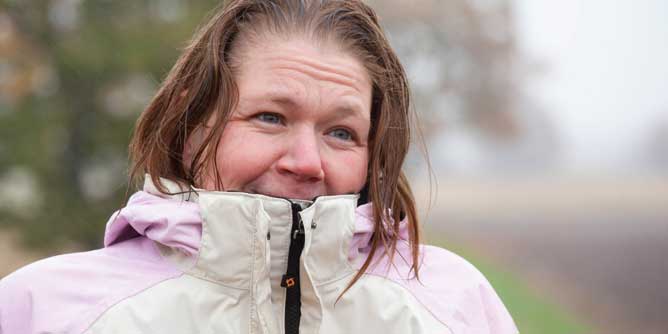
“It is important for me to be told that it is possible to start another life, and that there are others who have done it, that you can meet and talk to.”
She smiles, even if it rains, and shows us a place near her home that she thinks arouses a sense of freedom.
